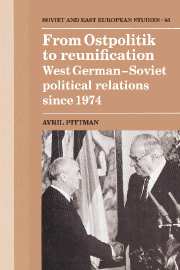Book contents
- Frontmatter
- Contents
- List of tables
- Preface
- Note on text
- Chronology
- Introduction
- 1 The Second World War and its aftermath, 1945–1974
- 2 Ethnic Germans
- 3 Berlin
- 4 The Federal Republic of Germany's relations with the German Democratic Republic
- 5 INF, Afghanistan and the post-Afghanistan period
- 6 Assessment of the Federal Republic of Germany's relations with the Soviet Union, 1974–1982
- 7 The Federal Republic of Germany's political relations with the Soviet Union after 1982
- Appendices
- Notes
- Bibliography
- Index
- Series list
5 - INF, Afghanistan and the post-Afghanistan period
Published online by Cambridge University Press: 12 October 2009
- Frontmatter
- Contents
- List of tables
- Preface
- Note on text
- Chronology
- Introduction
- 1 The Second World War and its aftermath, 1945–1974
- 2 Ethnic Germans
- 3 Berlin
- 4 The Federal Republic of Germany's relations with the German Democratic Republic
- 5 INF, Afghanistan and the post-Afghanistan period
- 6 Assessment of the Federal Republic of Germany's relations with the Soviet Union, 1974–1982
- 7 The Federal Republic of Germany's political relations with the Soviet Union after 1982
- Appendices
- Notes
- Bibliography
- Index
- Series list
Summary
The FRG's position after Afghanistan
The NATO double-track decision and the Soviet intervention in Afghanistan in 1979 caused a worsening in East–West relations. At the global level, however, East–West relations had begun to deteriorate much earlier. On the one hand, there was Soviet disappointment over trade with the United States, particularly over the tying of the most-favoured nation clause in the American–Soviet trade agreement of October 1972 to the granting of better emigration opportunities for Jews from the USSR (Jackson–Vanik Amendment). Moscow felt that a continuation of East–West détente was yielding little profit. On the other hand, the 1973 October war in the Middle East and the Soviet footholds in Angola, Ethiopia and South Yemen disappointed United States' expectations that détente would tie both sides up in a network of mutual commitments which would cause Soviet restraint in the Third World. Added to this was Soviet rearmament in the area of medium-range nuclear weapons while the American defence budget declined. The United States began to believe that détente was only giving one-sided advantages to the Soviet Union. A new tough mood took hold in the United States. It seems that one explanation of Soviet activity in the Third World could well have been a combination of two things: the USSR had always wanted to be equal with the USA in every respect, not just in a nuclear sense, and thought that détente would achieve this. The USA did not want to accept the Soviet Union as an equal power elsewhere in the world, it was only prepared to accept this in the nuclear sense. Once the Soviets realised this, one of their incentives for détente was lost.
- Type
- Chapter
- Information
- From Ostpolitik to ReunificationWest German-Soviet Political Relations since 1974, pp. 97 - 133Publisher: Cambridge University PressPrint publication year: 1992

